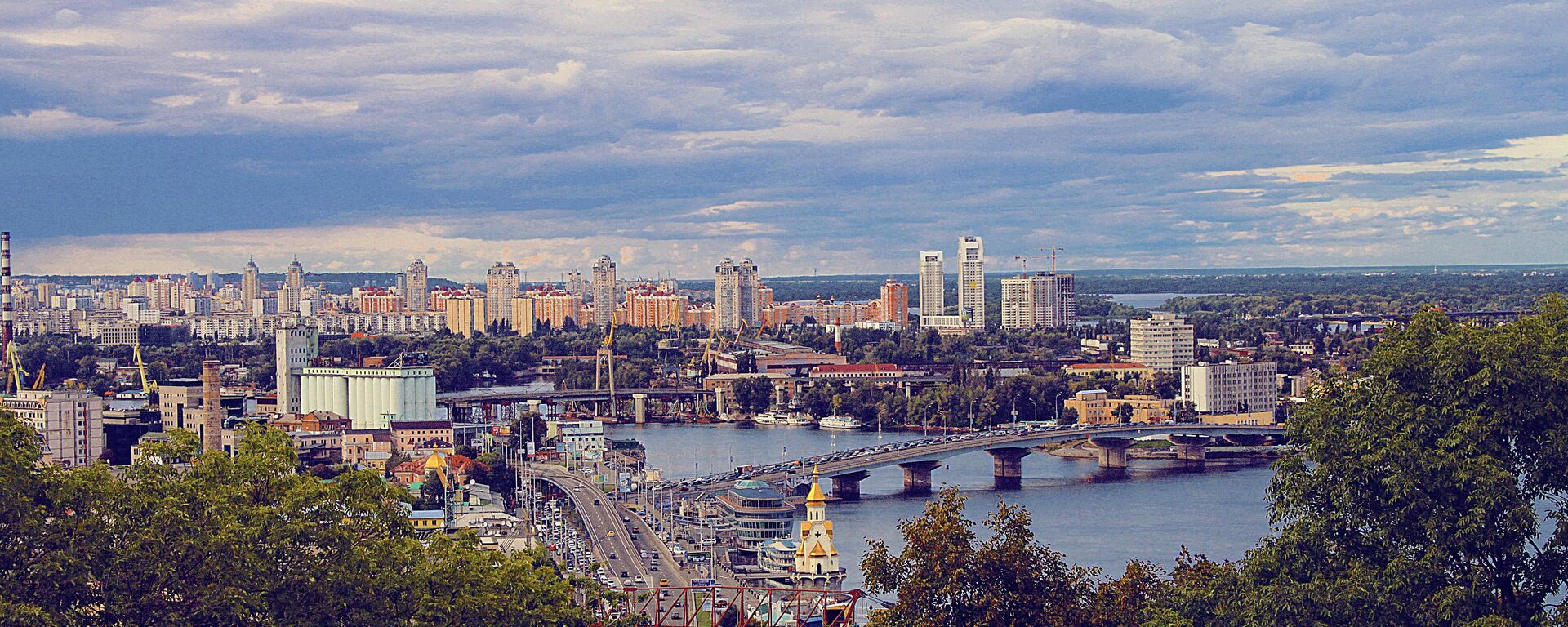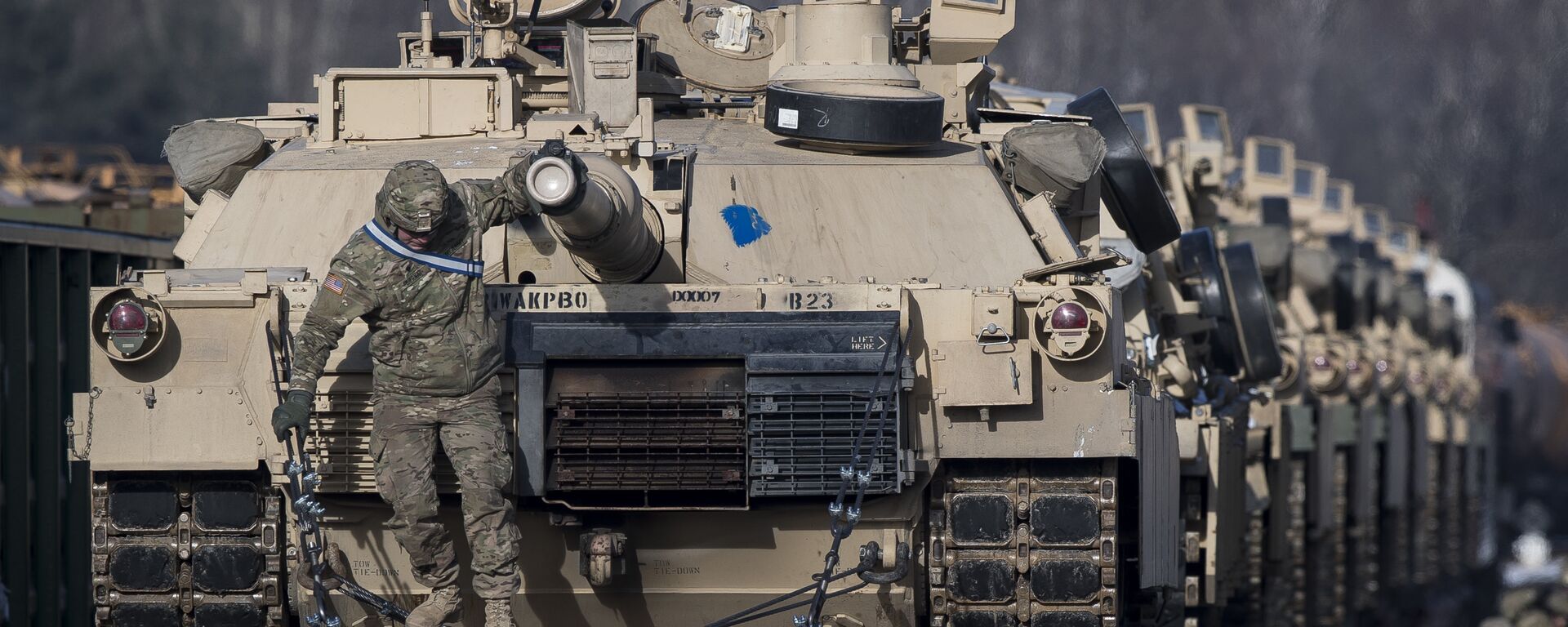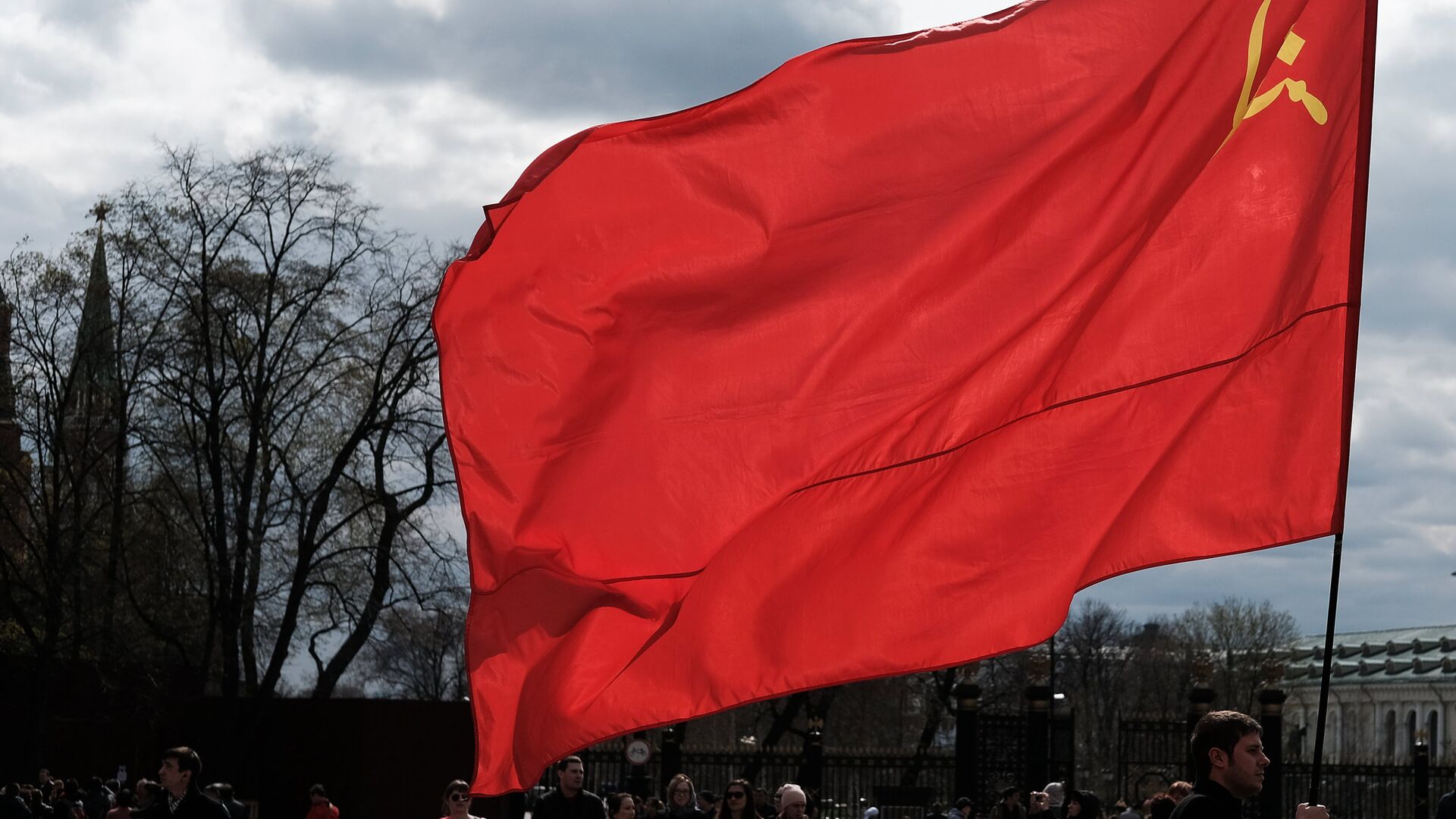https://sputnikglobe.com/20211224/30th-anniversary-of-the-ussrs-collapse-ukraine-ruined-chances-for-a-viable-cis-archives-reveal-1091766435.html
30th Anniversary of the USSR's Collapse: Ukraine Ruined Chances for a Viable CIS, Archives Reveal
30th Anniversary of the USSR's Collapse: Ukraine Ruined Chances for a Viable CIS, Archives Reveal
Sputnik International
As the world watched with baited breath the death throes of the Soviet Union 30 years ago, Western governments were pondering whether to quickly recognise the new states emerging from the bosom of the USSR, or wait until they prove themselves as responsible international actors.
2021-12-24T05:56+0000
2021-12-24T05:56+0000
2021-12-30T06:20+0000
cis
world
ussr
https://cdn1.img.sputnikglobe.com/img/104442/23/1044422377_0:336:2447:1712_1920x0_80_0_0_01d6fa19a6cce9910921466722d4395c.jpg
There was never any question in Western minds of whether or not to recognise Russia.The European Community, the precursor to the European Union, issued a statement on 23 December 1991, noting that, "the international rights and obligations of the former USSR, including those under the UN Charter, will continue to be exercised by Russia. They welcome the Russian government's acceptance of these commitments and responsibilities and in this capacity will continue their dealings with Russia, taking account of the modification of her constitutional status".Privately British politicians were careful to point out that legally it was not "recognition" of a new state. As Percy Craddock, foreign policy adviser to Prime Minister John Major explained: "We have not 'recognised' Russia: we do not need to do so, since we regard it as the continuation of the former Soviet Union under international law".Regarding the recognition of the other ex-USSR states, both Britons and Europeans had a "number of continuing concerns about the policies of the republics". The twelve member states of the EC attached "the highest importance to single and secure control of nuclear weapons, to the early accession of all republics [that remained in the USSR by that time], to the Nuclear Non-Proliferation Treaty as Non-Nuclear Weapons State, to acceptance by [the] republics of the commitments of the CFE Treaty and other Arms Control Agreements".And, of course, they expected the republics to honour their share of Soviet foreign debt. The recognition was contingent upon acceptance by the republics of the conditions in the statement of the twelve issued by the Dutch presidency of the EC.The portends were not good. The British Embassy telegraphed on the squabbles at the Minsk summit among the leaders of the newly-proclaimed Commonwealth of Independent States (CIS): "after 8-10 hours of difficult and at times contentious negotiation the commonwealth leaders in Minsk…evidently failed to agree on the most important military and economic issues".Ukrainian IntransigenceAt the Minsk summit on 30 December, the leaders did not sign an overarching charter, apparently ready in draft, because of objections by President Kravchuk of Ukraine. British Ambassador to the USSR Sir Rodric Braithwaite reported back to London:John Major's foreign policy adviser Sir Percy Craddock briefed the prime minister:The behaviour of the republican leaders at a later press conference told its own story, reported British Ambassador in Moscow Rodric Braithwaite.Negotiation with Belarus and Kazakhstan was relatively easy, said British diplomats, who observed the talks, but Ukraine was a different matter and the British foresaw political problems, by far the most serious of which would be over the military. While other Republics were content to leave the umbrella command of their armed forces to Russia, at least temporarily,Yet, in spite of "Ukraine's intransigence", the British had decided to recognise it, even while their hero Gorbachev was still presiding over the Soviet Union. A briefing note from the Foreign Office informed 10 Downing Street on 23 December 1991 that "plans already existed to open a separate British Embassy in Kiev".In fact, an embryonic British Embassy in Kiev sprang up in June 1990, when an "advance party" of three British diplomats set up shop at the historic Hotel Kiev, now the Premier Palace Hotel in the city centre, officially to prepare for a visit by Prime Minister Margaret Thatcher. It was immediately christened by the locals as "the British Embassy". At the same time, Thatcher assured Gorbachev she did not want to undermine Moscow in its relations with the republics. British foreign policy threw up quite a few ambiguities.Confusion Over the End of the USSRSince the EC [EU] statement on recognition of the republics referred to "the moment the dissolution of the Soviet Union enters into force", British Ambassador Sir Rodric Brathwaite asked then-Russian Foreign Minister Andrey Kozyrev when the dissolution would be formally announced. Kozyrev replied that this was unclear.Rodric Braithwaite suggested that "perhaps we should simply take the hauling down of the red flag over the Kremlin as marking the moment of dissolution. He [Kozyrev] agreed, but was not even clear whether this would happen on the 30th (as we had expected) or earlier", Rodric Brathwaite said.The British were worried there would be precious little time for the Dutch presidency of the EC to obtain assurances from the various republics referred to in the statement of the twelve.They needn't have worried, as Big Brother stepped in:The British did not want to be outdone. Recognition messages to the leaders of the ex-Soviet republics were quickly drafted for prime ministerial approval on 30 December. The Foreign Office was relieved that "agreement has been reached that nuclear weapons should remain under [the] single control [of Russia], and that Ukraine, Kazakhstan, and Belarus will become non-nuclear weapon states". But there were still "some profoundly worrying aspects" regarding nuclear, chemical, and biological weapons held by the republics. As senior British diplomat, Sir Len Appleyard, sent by Prime Minister Major on a fact-finding mission to Moscow, Minsk, and Kiev in mid-December 1991, reported:"The wilder fringe of the Ukrainian political spectrum could present problems in all these areas".Independent, But Not Sovereign?The recognition letters sent out to the emergent countries contained a curious edit: the formula "sovereign state", initially put in the draft, was deleted from the approved letter."The United Kingdom has separately recognised as independent sovereign states, Ukraine, Armenia, Belarus, Kazakhstan, Moldova, Tajikistan, Turkmenistan, Uzbekistan, and the Azerbaijan Republic".The prime minister's letter to President Yeltsin was different from the rest:John Major also explained that Britain regarded all treaties and agreements in force to which the United Kingdom and the USSR were party as remaining intact upon the "renaming of your country as Russia. Relations between our states continue taking account of constitutional changes and the change in your name".The British were still hopeful that the replacement of the USSR with the CIS could work, and told the republics:Prime Minister Major even expressed an interest in making reference to the possibility of Russia representing the CIS in the UN Security Council, just like Britain and France agreed in effect to further the views of the European Community/Union in the Security Council.There was an important caveat in recognising the borders of the new states: the republics must resolve their territorial disputes among themselves, and not drag London into them.The British had a reason for such a caveat. As top British diplomats observed:"The durability of agreements reached so rapidly by states with so many conflicting aims and interests must be in doubt".As a result, Sir Len Appleyard warned: "We have a prospect of a new band of basically pro-Western, politically assertive, and quarrelsome independent states running from the Baltic down to Central Europe".The British assumed that the definitive version of the agreement on the creation of the CIS was that agreed upon in Minsk. However, in his Alma Ata [then the capital of Kazakhstan] press conference, the Ukrainian president implied that he regarded as valid both the original version and the watered down document ratified by his own parliament.Kiev's ambiguity has been haunting the CIS and Ukraine's relations with Russia over these past 30 years.
https://sputnikglobe.com/20211220/us-advises-citizens-to-avoid-travel-to-ukraine-due-to-increased-threats-from-russia-1091676472.html
https://sputnikglobe.com/20191017/cis-countries-concerned-over-nato-activities-near-blocs-borders-1077074919.html
Sputnik International
feedback@sputniknews.com
+74956456601
MIA „Rosiya Segodnya“
2021
News
en_EN
Sputnik International
feedback@sputniknews.com
+74956456601
MIA „Rosiya Segodnya“
Sputnik International
feedback@sputniknews.com
+74956456601
MIA „Rosiya Segodnya“
soviet union, uk, ukraine, collapse of ussr
soviet union, uk, ukraine, collapse of ussr
30th Anniversary of the USSR's Collapse: Ukraine Ruined Chances for a Viable CIS, Archives Reveal
05:56 GMT 24.12.2021 (Updated: 06:20 GMT 30.12.2021) As the world watched the death throes of the Soviet Union with baited breath 30 years ago, Western governments were pondering whether to quickly recognise the new states emerging from the bosom of the USSR, or wait until they proved themselves as responsible international actors. Ukraine was a particular problem, as UK government files reveal.
There was never any question in Western minds of whether or not to recognise Russia.
The European Community, the precursor to the European Union, issued a statement on 23 December 1991, noting that, "the international rights and obligations of the former USSR, including those under the UN Charter, will continue to be exercised by Russia. They welcome the Russian government's acceptance of these commitments and responsibilities and in this capacity will continue their dealings with Russia, taking account of the modification of her constitutional status".
Privately British politicians were careful to point out that legally it was not "recognition" of a new state. As Percy Craddock, foreign policy adviser to Prime Minister John Major explained: "We have not 'recognised' Russia: we do not need to do so, since we regard it as the continuation of the former Soviet Union under international law".
Regarding the recognition of the other ex-USSR states, both Britons and Europeans had a "number of continuing concerns about the policies of the republics". The twelve member states of the EC attached "the highest importance to single and secure control of nuclear weapons, to the early accession of all republics [that remained in the USSR by that time], to the Nuclear Non-Proliferation Treaty as Non-Nuclear Weapons State, to acceptance by [the] republics of the commitments of the CFE Treaty and other Arms Control Agreements".
And, of course, they expected the republics to honour their share of Soviet foreign debt. The recognition was contingent upon acceptance by the republics of the conditions in the statement of the twelve issued by the Dutch presidency of the EC.
The portends were not good. The British Embassy telegraphed on the squabbles at the Minsk summit among the leaders of the newly-proclaimed
Commonwealth of Independent States (CIS): "after 8-10 hours of difficult and at times contentious negotiation the commonwealth leaders in Minsk…evidently failed to agree on the most important military and economic issues".
At the Minsk summit on 30 December, the leaders did not sign an overarching charter, apparently ready in draft, because of objections by President Kravchuk of Ukraine. British Ambassador to the USSR Sir Rodric Braithwaite reported back to London:
"Evidently because of Ukrainian intransigence there was very little progress on putting any substance into the commonwealth as a political entity".
John Major's foreign policy adviser Sir Percy Craddock briefed the prime minister:
"Ukraine still deeply suspicious of Russia, continues to block all avenues to real coordination in the new commonwealth".
The behaviour of the republican leaders at a later press conference told its own story, reported British Ambassador in Moscow Rodric Braithwaite.
"Yeltsin was careful in his comments and conciliatory in approach. Kravchuk had fewer inhibitions: obviously pleased with himself, he made a late and theatrical entrance, at one point waving to the television cameras while Yeltsin was trying to answer a question".
Negotiation with Belarus and Kazakhstan was relatively easy, said British diplomats, who observed the talks, but Ukraine was a different matter and the British foresaw political problems, by far the most serious of which would be over the military. While other Republics were content to leave the umbrella command of their armed forces to Russia, at least temporarily,
“The Ukrainians are determined to set up their own armed forces and withdraw from military cooperation, even if this jeopardises the commonwealth,” observed the British Ambassador.
Yet, in spite of "Ukraine's intransigence", the British had decided to recognise it, even while their hero Gorbachev was still presiding over the Soviet Union. A briefing note from the Foreign Office informed 10 Downing Street on 23 December 1991 that "plans already existed to open a separate British Embassy in Kiev".

20 December 2021, 18:59 GMT
In fact, an embryonic British Embassy in Kiev sprang up in June 1990, when an "advance party" of three British diplomats set up shop at the historic Hotel Kiev, now the Premier Palace Hotel in the city centre, officially to prepare for a visit by Prime Minister Margaret Thatcher. It was immediately christened by the locals as "the British Embassy". At the same time, Thatcher assured Gorbachev she did not want to undermine Moscow in its relations with the republics. British foreign policy threw up quite a few ambiguities.
Confusion Over the End of the USSR
Since the EC [EU] statement on recognition of the republics referred to "the moment the dissolution of the Soviet Union enters into force", British Ambassador Sir Rodric Brathwaite asked then-Russian Foreign Minister Andrey Kozyrev when the dissolution would be formally announced. Kozyrev replied that this was unclear.
"There might well not be a formal ceremony. Though the Supreme Soviet of the Union was meeting today, it was not clear whether the meeting would have a quorum, or even legal status, or the powers to declare the Union over. And – if we were all arguing that Russia was simply a continuation of the Soviet Union – there was something to be said for this lack of clarity", Kozyrev said.
Rodric Braithwaite suggested that "perhaps we should simply take the hauling down of the red flag over the Kremlin as marking the moment of dissolution. He [Kozyrev] agreed, but was not even clear whether this would happen on the 30th (as we had expected) or earlier", Rodric Brathwaite said.
The British were worried there would be precious little time for the Dutch presidency of the EC to obtain assurances from the various republics referred to in the statement of the twelve.
They needn't have worried, as Big Brother stepped in:
"…now that [the] Americans have recognised all republics it is clear that our partners in the Twelve [EC/EU] will wish to go ahead without delay".
The British did not want to be outdone. Recognition messages to the leaders of the ex-Soviet republics were quickly drafted for prime ministerial approval on 30 December. The Foreign Office was relieved that "agreement has been reached that nuclear weapons should remain under [the] single control [of Russia], and that Ukraine, Kazakhstan, and Belarus will become non-nuclear weapon states". But there were still "some profoundly worrying aspects" regarding nuclear, chemical, and biological weapons held by the republics. As senior British diplomat, Sir Len Appleyard, sent by Prime Minister Major on a fact-finding mission to Moscow, Minsk, and Kiev in mid-December 1991, reported:
"The wilder fringe of the Ukrainian political spectrum could present problems in all these areas".
Independent, But Not Sovereign?
The recognition letters sent out to the emergent countries contained a curious edit: the formula "sovereign state", initially put in the draft, was deleted from the approved letter.
"The United Kingdom has separately recognised as independent sovereign states, Ukraine, Armenia, Belarus, Kazakhstan, Moldova, Tajikistan, Turkmenistan, Uzbekistan, and the Azerbaijan Republic".
The prime minister's letter to President Yeltsin was different from the rest:
"I have considered this in details with my G7 colleagues, and taken full account of the recent historic developments which have led to continuity of statehood between Russia and the former Soviet Union. Its international rights and obligations including those under the UN Charter will now be those of Russia".
John Major also explained that Britain regarded all treaties and agreements in force to which the United Kingdom and the USSR were party as remaining intact upon the "renaming of your country as Russia. Relations between our states continue taking account of constitutional changes and the change in your name".
The British were still hopeful that the replacement of the USSR with the CIS could work, and told the republics:
"We welcome the establishment of the Commonwealth of Independent States, and shall do all in our power to help the development of stable, peaceful, and prosperous relations between the states formerly part of the Soviet Union".
Prime Minister Major even expressed an interest in making reference to the possibility of Russia representing the CIS in the UN Security Council, just like Britain and France agreed in effect to further the views of the European Community/Union in the Security Council.

17 October 2019, 14:31 GMT
There was an important caveat in recognising the borders of the new states: the republics must resolve their territorial disputes among themselves, and not drag London into them.
"Recognition shall not be taken to imply acceptance by Her Majesty's government of the position of any of the republics concerning territory which is the subject of a dispute between two or more republics".
The British had a reason for such a caveat. As top British diplomats observed:
"It is remarkable that after a matter of 3 ½ hours negotiation 11 republic leaders have agreed on an expanded commonwealth of independent states".
"The durability of agreements reached so rapidly by states with so many conflicting aims and interests must be in doubt".
As a result, Sir Len Appleyard warned: "We have a prospect of a new band of basically pro-Western, politically assertive, and quarrelsome independent states running from the Baltic down to Central Europe".
The British assumed that the definitive version of the agreement on the creation of the CIS was that agreed upon in Minsk. However, in his Alma Ata [then the capital of Kazakhstan] press conference, the Ukrainian president implied that he regarded as valid both the original version and the watered down document ratified by his own parliament.
Kiev's ambiguity has been haunting the CIS and Ukraine's relations with Russia over these past 30 years.






